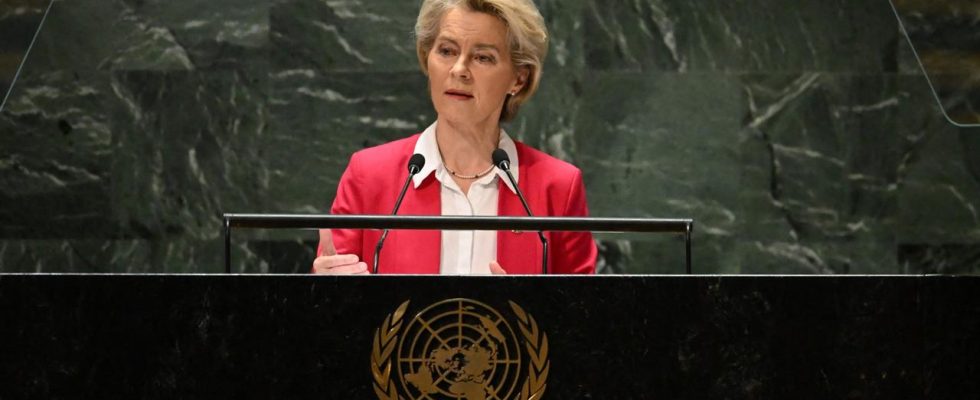When she announced a geopolitical EU Commission when she took office as president, many people laughed at von der Leyen. But two wars and several crises later, their role has changed radically.
To understand what is currently happening in Brussels, you have to go back about ten years. Back then, no one in the EU talked about geopolitics. The idea that Europe would one day support its own interests worldwide militarily was not an issue. Not to mention supporting a third country with arms worth tens of billions of euros.
The EU Commission was primarily an administrative apparatus responsible for regulating the internal market. Power politics was seen as a purely national matter, reserved for the governments in the capitals of Europe.
The EU has taken a historic leap
“It was basically forbidden to include words like power, interests or power politics in the official speeches,” remembers Luuk van Middelaar, a cabinet member and speechwriter for the first EU Council President Hermann van Rompuy from 2009 to 2014. Today van Middelaar is a historian and professor at Leiden University, a celebrated author and founder of the Brussels Institute for Geopolitics.
Thanks to his experience in the EU’s engine room, today’s scientist can assess like no other the historic leap the European Union is making in world politics.
“The EU has come a long way,” van Middelaar said in an interview with France 24 television, recalling that it was founded after the Second World War as a peace project. “So the EU is now coming from afar to the stage where it is supplying weapons and financing the arms deliveries of member states.” This means that the EU is no longer the neutral union that stands on the sidelines and watches the geopolitical games of others.
The idea is now hardly seen as absurd by the geopolitical EU Commission.
The Geopolitical Commission
The woman who put geopolitical thinking into the vocabulary of Europeans is Ursula von der Leyen. She announced that she wanted a “geopolitical commission” when she took office as Commission President at the end of 2019. This was initially laughed at as it seemed to many in Brussels to be exaggerated.
Two wars and several crises later, hardly anyone disputes that Europe should have geopolitical goals in mind. And the idea is no longer laughed at as often by the geopolitical commission. American media describe von der Leyen as the most powerful woman in the world – none of her predecessors at the head of the Commission were taken remotely seriously in Washington, neither Juncker nor Barroso.
Von der Leyen takes the lead
This is probably because von der Leyen is taking the lead and steering Europe through the global crises with a clear compass. US President Joe Biden appreciates this; he sees her as a partner on equal terms, finally someone who dares to speak for all of Europe and does not leave it to the national capitals.
“Thank you, Madam President, for your leadership!” he shouted to the German during her first visit to Brussels. And at the G20 summit in New Delhi in September, it was no longer a question for Biden that he would present his offer of cooperation to the countries of the global south together with the head of the EU Commission. And not with individual heads of state and government who also traveled from Europe.
Leadership is the quality that you hear most often in Brussels when talking about the President of the Commission. Added to this is the ability to act quickly. Sanctions against Russia, for example, were already being prepared when many capitals were still hoping that Putin would not get serious. And she declared that Ukraine belonged to Europe just a few days after the start of the war and then again and again. So often, until the beautiful words that hardly anyone took seriously at first became the promise of accession negotiations.
The von der Leyen method also includes saying things that others only think. She said of China’s strongman Xi Jinping that he simply wants “China to become the most powerful nation in the world.” Based on this insight, she developed a new China strategy for Europe; the EU countries should take fewer risks in their economic relations, but should not cut them off completely. “De-risk but no de-couple” is the catchy slogan that the Chancellor has adopted, as have some other heads of government.
criticism of Claim to leadership
However, von der Leyen’s claim to leadership is definitely met with resistance; not everyone likes the quick and sometimes lonely decision-making in Berlaymont, the commission’s headquarters. Most recently in Middle East politics. Far too Israel-friendly, far too German – this criticism came from countries that are closer to the Palestinians.
But criticism also came from Berlaymont’s two neighbors in Brussels, two men who actually see themselves as responsible for Europe’s foreign policy: chief diplomat Josep Borrell and Council President Charles Michel. Both had their employees rail against von der Leyen’s visit to Israel.
Perhaps, diplomats said, it was because they themselves had not received an invitation from the Israeli government. But perhaps also because Borrell and Michel always have to laboriously coordinate their positions with the 27 governments, which is a hopeless undertaking in Middle East politics.
The President of the Commission has it easier. She simply represents the position of the President of the Commission, and she announced early on that she was thinking in geopolitical dimensions. Already when taking office.
Helga Schmidt, ARD Brussels, tagesschau, December 22nd, 2023 3:36 p.m

